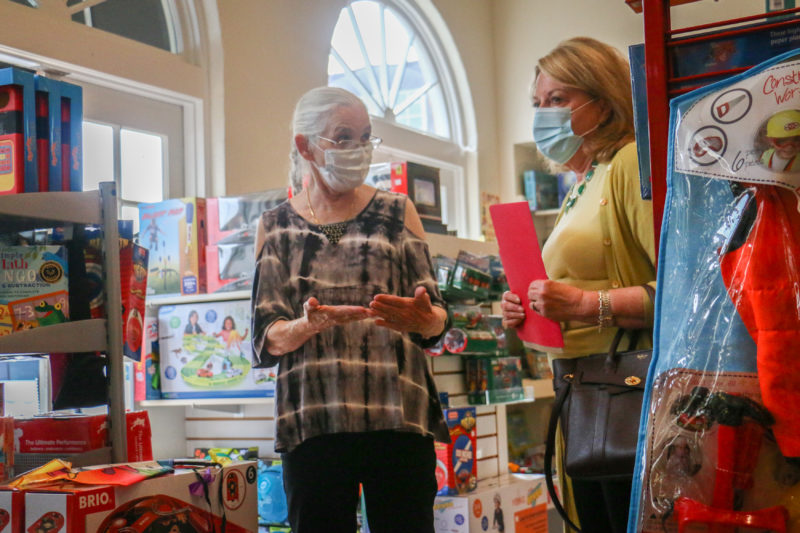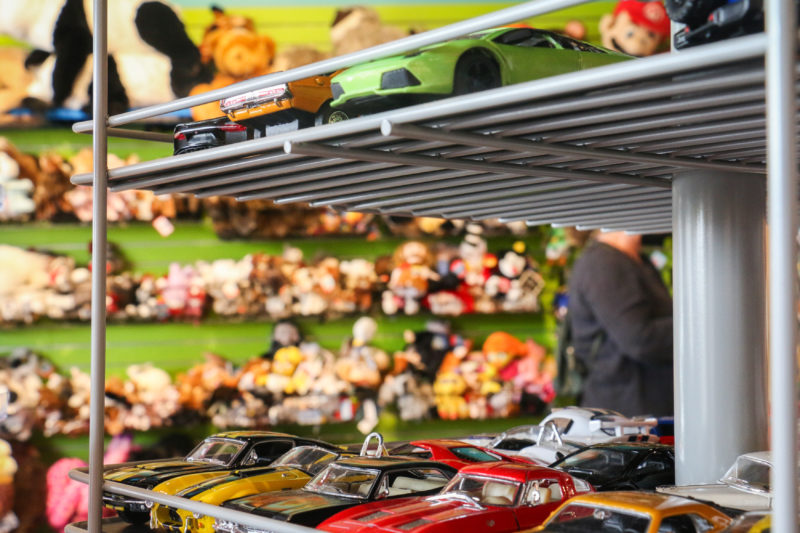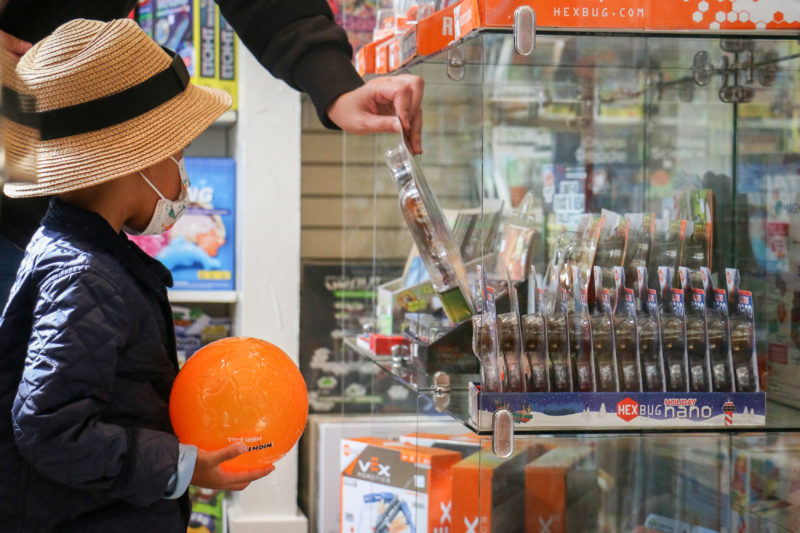Santa and the Supply Chain: How Austin Toy Stores Are Coping with Christmas
By Eniola Longe
Reporting Texas

Sharon Linsalata, store manager at Over The Rainbow, left, makes suggestions to Dorothy Drummer on what kind of gifts to get for one of her nine grandchildren on Nov. 9, 2021, in Austin. Eniola Longe/Reporting Texas
Terra Toys on Anderson Lane transports you to simpler times when all you thought about was what toy you were going to ask Santa for at Christmas. But gift giving this year will be anything but simple, and Santa might be a month or two late.
With global supply chain disruptions affecting industry, independently owned toy stores have had an increasingly hard time stocking their shelves.
“There are tons and tons of vendors that are trying to fill our orders,” said Sylvia Allsup-Edwards, CEO of Terra Toys. “But things also run out.”
During the year and a half of the worldwide COVID-19 pandemic, many economic activities came to a screeching halt. Factories shut down, international shipping was disrupted and deliveries were delayed. Only two of the top 10 toy companies in the world are headquartered in the U.S. while seven are headquartered in Asia.
Three locally owned toy stores in Austin described how the global supply chain problems caused by COVID-19 will affect gift buyers this holiday season. And they had the same message for parents:
“If you see it and your kid wants it and you want to buy it for them, get it when you see it,” Allsup-Edwards said. “Don’t put it on the list or wait for it.”
Dorothy Drummer, a shopper at Over the Rainbow, a cozy-looking toy store on 38th Street in Austin, took those warnings to heart and was doing her Christmas shopping well before Thanksgiving. She has nine grandchildren under the age of 10. With the global supply chain disruptions, she had sent an email to all the moms urging them to shop early for presents this year.
Drummer has already purchased gifts for most of her grandchildren. She bought some of those gifts at Austin toy store Over the Rainbow.
“I’m not confident I’m going to have enough merchandise at Christmas at this point,” said Stanley Moore, owner of Over the Rainbow. “It’s out of our control.”
Moore has never experienced anything like this since opening the store in 1975 at its initial location on Exposition Boulevard, he said. Shipments started slowing down several months ago, and Moore had more incomplete shipments than he had seen in the past.
“I’ve got a lot of stuff I’ve ordered that hasn’t come in at this point,” Moore said.

A cross-section of toy cars and teddy bears at Toy Joy on Nov. 9, 2021 in Austin. Eniola Longe/Reporting Texas
Moore is optimistic he would be able to sell the toys if he can get them as people seem to be buying a lot this year.
“This is an unusual year, but I will say this, sales right now are very good.” Moore said. “We did better in October than we have done in several years.”
Terra Toys started as a snow cone stand on Guadalupe Street in 1977, with two employees, Romalda Allsup and Charles Edwards. Nobody was seeking snow cones in the winter, so the couple pivoted the business into a toy making shop.
“In the original store, everything was made out of wood and painted by my mum,” said Allsup-Edwards, who now runs the store founded by her parents. “Terra is Latin for earth.”
With growth came vendors. And with vendors comes reliance on a supply chain that can reach around the world.
“We have a little over 2,500 vendors. Some have no supply chain issues at all and some have cut off ordering since September,” Allsup-Edwards said. “We are seeing an enormous list of items that we have ordered and haven’t come in.”
Toy Joy, which opened its original location at 29th and Guadalupe Street in 1987, now has three other locations in Austin.
Manufacturers seem to be fulfilling larger orders from large toy stores to the detriment of smaller toy shops, Ana Elizondo, manager at Toy Joy, said.
“We still aren’t receiving everything we have ordered, like Pokemon cards,” Elizondo said. “We have had to limit some items to one per customer.”
Store owners are also having to pay higher prices for the toys on their shelves.
That’s partly due to rising costs for transporting shipping containers from Asia to the United States. “It has gone from about $9,000 per container to about $31,000 per container,” Allsup-Edwards said. “So, we are either having to pay pretty decent increases in the price of the toy or some companies are just no longer doing free freight.”
Some toy suppliers increased their toy prices as much as 30%, Moore said.
“Companies usually set their prices at the beginning of the year and for the most part, they keep that price throughout the year. This year is different,” Moore said.
Allsup-Edwards noted that many suppliers also have stopped offering incentives, such as free shipping, to retailers.

Desiree Cronk, picks up a Hexbug Nano while her son, Tanaka Ozara, 3, holds on to a ball at Over The Rainbow toy store on Nov. 9, 2021, in Austin. The toy store has been affected by the global supply chain disruptions and is awaiting shipments of some toys. Eniola Longe/Reporting Texas
Along with distribution problems and price increases, manufacturing has also taken a hit. “Of the 100,000 toys in our shop, about four to five thousand are already back-ordered but they won’t be able to fulfill back-orders until probably after January, ” Allsup-Edwards said.
“People think we just do not know what to buy and so we have to constantly tell them no, we ordered these items but it’s just back ordered and no one can get them,” Elizondo said. “It’s just been really hard for us to maintain full shelves. We just got a Hello Kitty shipment and it’s already gone.”
A back-order happens when a company knows you want an item that is not in stock, they put you on a list to get it first when it becomes available.
“You’re probably not going to get everything you want, I’d recommend that you shop early but also shop late,” Moore said. “I’m probably going to get stuff coming in at any point in time.